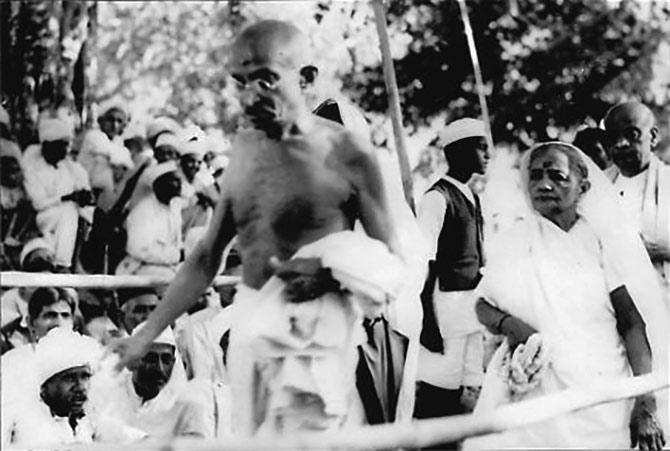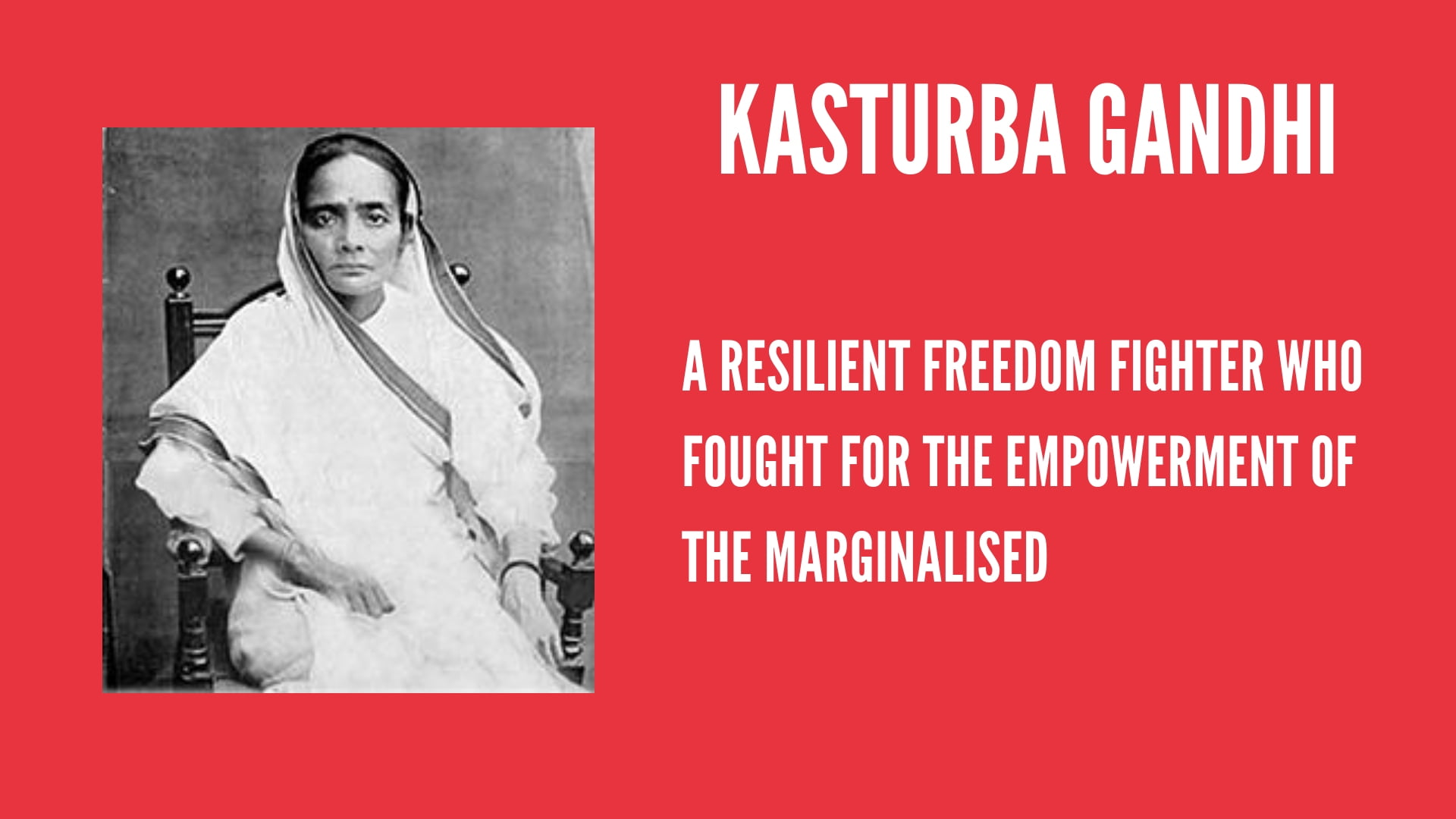History has often presented Kasturba Gandhi as the subsidiary shadow of her husband, Mohandas Karamchand Gandhi. While the ‘Father of the Nation’ is revered for being on the front-lines of the freedom struggle, Kasturba has left an unforgettable mark on Indian history with her significant, although under-recognised contributions, to the struggle for independence.
Early Life
Kasturbai Makhanji Kapadia was born on 11 April 1869. She hailed from economically prosperous and reputed family. In spite of her immense contribution to the freedom struggle, little is known of Kasturba’s early life. In May 1883, the 13-year old Kasturba was married off to Mohandas Karamchand Gandhi in a marriage arranged by their parents.

Image Source: News 18
In reference to his marriage, Gandhi later wrote in his autobiography, “I do not think it meant to me anything more then the prospect of good clothes to wear, drum beating, marriage processions, rich dinners and a strange girl to play with …Iittle did I dream that one day I should severely criticize my father for having married me as a child. Everything on that day seemed to me right and proper and pleasing. There was also my eagerness to get married…” We do not know what young Kasturba felt as it was not recorded.
Also read: Abadi Bano Begum AKA Bi Amma: The Burqa Clad Freedom Fighter | #IndianWomenInHistory
Gandhi writes that he was a jealous husband and often without reason suspected his wife of infidelity. He did not allow her to go anywhere without his permission. This often led to quarrels between them as Kasturba was a spirited girl who did not want her movements restricted. She insisted on going out whenever she wanted whether it was to visit friends or to go to temple.
Kasturba was a spirited girl who did not want her movements restricted. She insisted on going out whenever she wanted.
She did not receive formal education but remained a curious and fast learner all her life. Gandhi confessed that his wife possessed more common sense than him and also the ability to judge people.
Beginning Of Her Activism
For years, she lived away from Gandhi Phoenix Settlement near Durban. Then in 1913, she took part in protests against the ill-treatment of Indian immigrants in South Africa, for which she was arrested.
Aparna Basu writes, “She had great courage, both physical and moral as can be seen from the grave illnesses she suffered and overcame, the hardships of her early days in South Africa and during her imprisonments. In fact she was a source of strength to her fellow women prisoners.”

Image Source: Rediff News
She portrayed great courage when she was in South Africa. On one occasion, she helped Gandhi escape when a white mob was threatening him and found shelter in another house along with their children. While in Phoenix she lived alone in the wilderness and when Gandhi was away she would keep everyone in the settlement in good cheer.
According to Aparna, “She began to exert very gently and in a dignified manner her authority and won the respect and cooperation of everyone. Though uneducated, she maintained the accounts accurately. She was extremely self-disciplined and soon became everyone’s mother or Ba.”
Political Career
Kasturba and Gandhi permanently left South Africa in July 1914 and returned to live in India. Even after having severe health issues in South Africa her role was extraordinary there.
in 1913, she took part in protests against the ill-treatment of Indian immigrants in South Africa, for which she was arrested.
In 1917, Kasturba focused on helping improve the welfare of women in Champaran, Bihar, where Gandhi was working with indigo farmers. She taught women hygiene, discipline and health. As Gandhi launched Civil Disobedience and Quit India Movement, Kasturba was a front-liner at these agitations. She would often step into the role of leading the movements when Gandhi was detained. Kasturba played an active role in the Borsad Satyagraha of 1923-24 and the Bardoli Satyagraha of 1928. Bardoli had set a new example as it was the first time that the rural women participated in the freedom struggle.
In 1930 when Gandhi was going for Dandi march, Manilal’s (Gandhi’s son) young wife, Sushila started to cry. Kasturba asked them to be brave. “Our men are warriors,” she said, “We are warriors’ wives. We must give the men courage. If we are brave, they will be brave.” Kasturba did not believe in qualities like courage only belonging to a particular gender.

Image Source: Wikimedia
Kasturba was going from town to town and village to village on foot or by bullock cart visiting workers and urging women to picket liquor shops, spin and wear khadi. She looked like a soldier of satyagraha engaged in a grim fight.
Kasturba was not only concerned with freedom movement, but also with casteism. She often voiced out against the practise of untouchability In a public meeting which was held in Triplicane on behalf of number of associations including the Madras Harijan Sevak Sangh, Kasturba represented Gandhi and from there went on a tour of the region to plead for the rights of Dalits and appealed to remove all discriminations against them.
She once wrote a powerful speech addressing the country during one of the Quit India Movement marches, Aparna Basu writes, “The women of India have to prove their mettle. They should all join in this struggle, regardless of caste or creed. Truth and nonviolence must be our watchwords.”
Kasturba As A Wife
Kasturba opened her house to the nation and the freedom struggle. She fasted when Gandhi was in prison, gave up on things she liked – her jewellery, good food, and even her religious beliefs.
In 1906, when Gandhi took a vow of chastity, she recognised his choice and made her peace with it. She had her own ideals and stuck by them, but never attempted to try and bend others, including her children, to her will.

Image Source: NDTV
Gandhi wrote that Kasturba was not behind him in any respect. “If anything she stood above me. But for her unfailing co-operation I might have been in the abyss… She helped me to keep wide awake and true to my vows. She stood by me in all my political fights and never hesitated to take the plunge. In the current sense of the word, she was uneducated; but to my mind she was a model of true education.”
Succumbing to the ill-treatment meted out by the police and the strain inflicted upon her body due to her role in the agitation, Kasturba finally gave in to the physical confines of the world in 1944, three years before India would wake up as an independent nation.
Also read: Hansa Mehta: Reformer In Gender Justice And Education | #IndianWomenInHistory
Her role as a freedom fighter, as a khadi promoter is praiseworthy. Instead of subsidising her role in shadows of Gandhi, we should remember her by her own strength, achievements and sacrifices
References
- The Quint
- NDTV
- My Experiments with Truth by M. K. Gandhi
- Kasturba Gandhi by Aparna Basu
- NDTV India
About the author(s)
Areeba Sundus is a History student from Jamia Millia Islamia with her specialisation in Modern Indian History. Feminism is a crucial part of her identity and she wants to become a voice of the voiceless.





Well articulated!